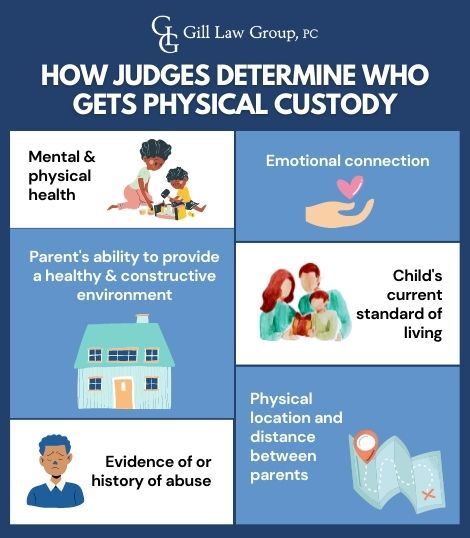

Orange County Child Custody Lawyer
Navigating Your California Child Custody Case with Confidence
At Gill Law Group, PC, we recognize that child custody and visitation disputes can be incredibly stressful and emotionally draining. Led by experienced attorney Raja Gill, our team is committed to guiding you through every step of the custody process. We are deeply familiar with the intricacies of California custody laws and the unique challenges families face in Orange County. Our mission is to work tirelessly to reach a fair and amicable resolution. Still, when necessary, we are prepared to advocate vigorously for your rights in court to ensure the best outcome for your child.
Our approach emphasizes open communication and personalized legal strategies. We start by understanding your unique family dynamics and concerns, allowing us to tailor our approach to your needs. Keeping the child's welfare at the forefront, we actively seek solutions that support a stable and nurturing environment.
Call Gill Law Group today at (949) 681-9952 to schedule a meeting with our child custody attorneys in Orange County. We have offices in Newport Beach and Irvine.
What Is Child Custody?
Child custody refers to parents' legal and practical responsibilities for their child's care and upbringing following a separation or divorce. In California, custody is divided into two main types:
- Legal Custody: This refers to the authority to make significant decisions regarding a child's upbringing, including their education, health, and general welfare. Legal custody can be shared between parents or awarded to one parent if it is in the child's best interest.
- Physical Custody: This concerns where the child will live and how time is divided between parents. Physical custody can be exclusive to one parent or divided between both parents. The goal is to ensure the child has a stable and supportive living arrangement.
When making custody decisions, the courts prioritize the child's overall well-being, considering factors such as the child's needs, the parent's ability to provide a safe environment, and the relationship between the child and each parent.
How Is Child Custody Decided in California?
In California, the courts are guided to seek the child's best interest when making custody and visitation orders. In other words, the courts are directed by law to do whatever is in the child's best interest in any given scenario.
In most situations, the courts prefer joint legal custody so that both parents can participate in making important decisions about their children. However, sole custody is sometimes awarded because of one parent's inappropriate behavior or neglect.
Even in scenarios where joint physical custody is ordered, the child can spend more time with one parent and less with the other. The degree of conflict between the parents and whether they can cooperate in co-parenting often determines the amount of detail and restrictions on parenting schedules.
California courts also assess the child's attachments and bonds with each parent. The child's age, health, and established living patterns are further evaluated to create a custody arrangement that fosters stability and continuity in the child’s growth and development. Mediation is often encouraged to help parents reach an amicable agreement outside of court whenever possible.
Determining Physical Custody in California

Along with issues such as legal custody, a judge will base decisions on what is in the child's best interest.
California courts base decisions on what benefits child parents' active involvement in issues such as legal custody.
Courts in California generally recognize the benefit of both parents playing an active role in a child's life. For this reason, there is a strong presumption that joint physical custody should be awarded whenever possible.
Sole custody agreements are typically only considered when one parent represents a danger to the well-being of a child, such as in cases of domestic violence. However, sole physical custody does not preclude the possibility that the non-primary parent may be awarded visitation rights.
When awarding physical custody, a judge may consider numerous factors, including:
- The mental and physical health of all involved parties
- The emotional connection between a child and each parent
- The parent's ability to provide a healthy and constructive environment
- A child's current standard of living and routine
- The physical location and distance of parents from each other
- Any evidence or history of substance abuse or domestic violence
The role of siblings and their relationship with the child in question can also play a significant part in determining custody arrangements. Additionally, courts may gather input from child psychologists or social workers better to understand the child's needs and family dynamics, ensuring decisions are genuinely in the child's best interest.
What Makes A Parent Unfit in Child Custody Cases?
A parent may be deemed unfit and potentially lose custody if they consistently exhibit behavior that endangers the child's safety or well-being. The court evaluates a range of evidence to determine whether a parent's conduct justifies awarding sole custody to the other parent. To prove a parent is unfit, you might present the following evidence:
- Professional Testimony: Statements from counselors, therapists, coaches, or other professionals who have observed the parent's interactions with the child.
- Legal Records: Police reports, particularly those related to domestic violence or other criminal activities.
- Medical and Educational Records: Documentation from schools or medical professionals that may indicate concerns about the parent's ability to provide appropriate care.
- Home Conditions: Evidence from home inspections or photographs showing unsafe or unhealthy living conditions.
- Criminal Background: Records of past criminal behavior that could affect the parent's suitability for custody.
Determining a parent's fitness can be a complex legal journey requiring thorough evaluation and sometimes ongoing monitoring. Sometimes, the court may appoint a guardian ad litem to represent the child's interests to ensure the child's voice is considered in custody decisions. Continuous reevaluation is possible as circumstances or the parent's behavior evolves, keeping the child's safety and well-being the top priority.
Are you struggling with a child custody case in Newport Beach or Orange County? Contact our child custody lawyers today to get the help you need.
Understanding Child Custody Mediation in Orange County
Child custody mediation is a crucial component of the custody process for parents in Orange County. It allows both parties to reach a mutual agreement outside of a courtroom. The goal of mediation is to minimize conflict and encourage cooperative parenting. In mediation, a neutral third party helps guide parents through discussions on custody arrangements, visitation schedules, and any other relevant issues. By fostering a communicative environment, mediation can help parents work through disagreements in a structured manner.
In Orange County, courts often mandate mediation before proceeding to a custody trial. This process saves time and resources and can lessen the emotional toll on both parents and children. Successful mediation results in a written agreement that outlines the terms of custody and visitation, which can then be submitted to the court for approval. Parents are encouraged to actively participate and express their concerns during mediation, as the outcome significantly impacts their daily lives and their child’s future.
Local Resources for Families Undergoing Custody Changes in Orange County
Orange County offers a wealth of resources for families navigating child custody changes. These resources are designed to support parents and children during this transition. Local family support services provide counseling, workshops, and educational materials tailored to various family dynamics and legal contexts. These programs aim to educate parents on co-parenting strategies, communication tips, and minimizing the impact of custody changes on children.
The Superior Court of California, County of Orange, also provides access to self-help centers and family law facilitators who can guide parents through the legal intricacies of custody arrangements. Additionally, community organizations like Parent Engagement Academy offer parenting classes and support groups, allowing parents to connect with others undergoing similar experiences. Leveraging these resources can help families adjust to new custody arrangements more smoothly, ensuring children's well-being remains a priority.
Financial Considerations in Child Custody Cases
Financial responsibilities are a significant aspect of child custody matters in Orange County. The court can issue child support orders to ensure that a child's financial needs are consistently met, regardless of the custody arrangement. Factors such as the income of both parents, the child's needs, and the time each parent spends with the child are considered in determining support amounts. These orders cover essential living expenses, healthcare, education, and other necessary expenditures.
In some scenarios, financial disputes can arise during custody discussions. Parents are encouraged to be open and transparent about their financial situations to prevent misunderstandings and ensure fair judgments. By understanding how financial aspects are intertwined with custody matters, parents can better prepare for discussions and negotiations. It’s also essential for parents to be aware of legal recourse should one party fail to meet their financial obligations, as child support enforcement mechanisms are in place to uphold these orders.
FAQs About Child Custody
Does the law prefer giving custody to the mother?
No, there is no legal preference for either the child’s mother or father. Courts are concerned with what custody arrangement serves the best interests of the child. This process involves a case-by-case analysis of the specific circumstances of a case.
How Can Parents Modify an Existing Custody Arrangement?
Modifying a custody arrangement requires demonstrating a significant change in circumstances that affects the child's welfare. Parents can file a motion with the court to request modifications but must provide substantial evidence supporting their claim. Common reasons for modification include relocation, changes in parental employment or health, and changes in the child's needs or preferences.
Is It Possible for Grandparents to Obtain Custody or Visitation Rights?
In some instances, grandparents in Orange County can pursue custody or visitation rights. This usually occurs when the parents are deemed unfit or if it benefits the child's welfare. Courts evaluate the existing relationship between the grandparent and child and the overall family dynamics to make a decision.
What Steps Can I Take to Prepare for a Custody Hearing?
Preparing for a custody hearing involves gathering relevant documentation, such as school and medical records and evidence of the child's relationship with each parent. Creating a custody proposal outlining a practical living arrangement and visitation schedule is also crucial. Consulting with a child custody attorney in Orange County can provide valuable guidance and ensure your presentation is well-organized and comprehensive.
How Does Relocation Affect Custody Arrangements in Orange County?
Relocation can significantly impact child custody arrangements, often necessitating a formal modification of the current order. Parents planning to relocate must notify the other parent, who can contest the move if it disrupts the child's established living situation. The court will decide whether the relocation serves the child's best interests, considering factors like distance, impact on visitation, and the reasons for the move.
Contact Our Orange County Child Custody Lawyer Today
Navigating child custody matters can be challenging and emotionally charged. At Gill Law Group, PC, we are dedicated to guiding you through this complex process with compassion and professionalism. Whether you are seeking to establish a fair custody arrangement or facing disputes that require resolution, our goal is to advocate for your child's best interests while striving for a resolution that supports their well-being. Contact us today to discuss your child custody matter and explore how we can help you achieve a positive outcome in your custody situation.
Contact Gill Law Group, PC today to schedule a meeting with our child custody lawyer in Orange County. We have offices in Newport Beach and Irvine.

Our Client Testimonials
See Why People Choose the Gill Law Group, PC
-
“I would highly recommend this professional firm and his staff.”- Kathleen H.
-
“I could not have survived the divorce without this team.”- Jamie Lima
-
“Raja and his fellow Associate Attorneys and Office Personnel have all been excellent.”- Tim A.
-
“I have worked with other attorneys and they do not compare the The Gill Law Group.”- John B.
-
“They will simultaneously fight for you and be a calming voice of reason. All around awesome folks that know what they’re doing.”- Joe Remmers
-
I wholeheartedly endorse this lawyer. I have had the distinct pleasure of working with Mr. Gill for the last few years and am also proud to call him a friend. He is knowledgeable and cares about his clients.- David Milligan
-
Raja Gill is an exceptional lawyer with the requisite knowledge, experience, and compassion to deliver superior results for his client. Possessing an eye for detail, Mr. Gill can handle the most complex matters; cases that will leave other attorneys in the dark. If you are looking for an attorney who will far exceed your expectations, look no further than Mr. Gill.- Kapesh Patel
-
He is good and on top of everything. He contacted me frequently and got me what I wanted. I'll recommend him to anyone that needs professional help.- Former Client







.2510031520579.png)

